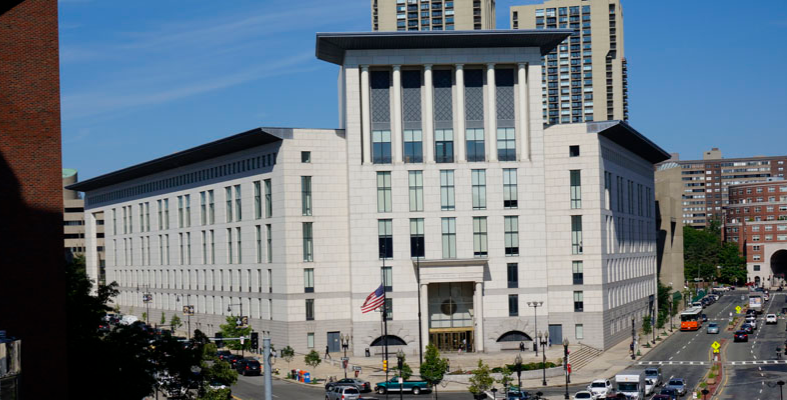New Housing Court Rules Aim to Reduce Eviction Defaults and Move Summary Process Cases Faster
. Posted in News - 2 Comments
By Eric Weld, MassLandlords, Inc.
New operating rules recently announced by the Massachusetts Housing Court hold good news and some not so good news for landlords across the state.

Western Housing Court, located at 37 Elm Street, Springfield, Mass.
The new rules were issued as Interim Housing Court Standing Order 1-23: Continuation of temporary modifications to court operations. The “interim” in the rules’ title suggests that further changes may be in the offing.
Standing Order 1-23 replaces Standing Order 6-20, a third-generation set of Housing Court operating rules in place since the Covid-19 pandemic temporarily ended in-person court events (and, for a time, suspended eviction cases). Standing Order 1-23 provisions are effective as of June 5, 2023.
Standing Order 1-23 comes in the wake of the expiration of Chapter 257 of the Acts of 2020, a Covid pandemic law that put a hold on any eviction cases in which an application for rental assistance was active.
Modified Two-Tier Process for Eviction Cases
Standing Order 1-23 continues a two-tier process for summary process filings, with modifications.
First-tier court events in summary process cases are a preliminary step to help both parties, with assistance from court Housing Specialists. Here is where plaintiffs and defendants can determine possibilities for rental assistance, agree to mediation, present evidence, reach a resolution or find another solution to the case that could avoid further court action, such as a trial.
First-tier housing court events are also sometimes called Housing Specialist Status Conferences because they are, essentially, information-gathering sessions held with housing specialists to determine legal options and potential outcomes of a case. First-tier court events are mandatory to attend for both parties in the case. If either or both parties fail to attend the scheduled first-tier event, they could be in default and the case could be dismissed.

The Edward Brooke courthouse in Boston houses the eastern division of the housing court and the administrative office for the state. Public Domain.
Fewer No-Shows Resulting in Default?
A new regulation added to the updated court rules may result in reduced defaults due to defendants not showing up for scheduled tier-one court events.
The new rule stipulates that the plaintiff (landlord) or their attorney will be required to serve notice to listed defendants (tenants) in a summary process case regarding a scheduled first-tier court event once they have been notified by the court of that event date, time, and whether it will be virtual or in-person. That notice must be served at least 14 days before the court event date.
The rules stipulate that a constable or sheriff shall be hired to serve the court event notice, in the same manner as serving a summary process summons and complaint. In that case, verification of service is provided by the hired constable or sheriff.
The cost of hiring a constable or sheriff to provide such verification of service will be paid by landlords, or may be negotiated as part of an agreement, through mediation, for example.
While this regulation is intended to cut down on defaults due to defendants not showing up for first-tier court events, it’s not certain to. A constable or sheriff can verify service of the court event notice, but they are not required to make contact with defendants to make sure they received it. A constable or sheriff could tape the notice to a tenant’s door, for example, and provide verification that that notice has been served. But that doesn’t guarantee that the tenant will have seen and read the notice.
And even if tenants read the served notice, they could still claim that they didn’t see it and not show up for the scheduled court event. Or they might see the notice and still not make it to court for any number of reasons: they’re intimidated by courts and judges, they fear they don’t have funds to remain in the rental, they have car trouble on the way to the courthouse.
Defaults may still occur even in cases when notice is served and received. Time will tell if the added burden on landlords, to hire a constable or sheriff for service of the court notice, is effective.
Shorter Eviction Time Frame
If no resolution emerges from a first-tier court event, such as an agreement between landlord and tenant to work with a mediator or to continue the case, it will move on to a second-tier event, a trial.
Standing Order 1-23 also applies a time frame to the scheduling of trials that should speed up the eviction process. If a first-tier event moves on to a second-tier event – a trial – that trial must now be scheduled two weeks after the first-tier court event. Previous rules stipulated scheduling such trials “no sooner than” 14 days after the first-tier event.
Also added: before the conclusion of the first-tier court event, both the plaintiff and defendant shall be given written notice of the trial date, time and location. That notice will serve as the only required notice of the scheduled trial. It also removes any grounds for contesting the service of notice for a trial.
Time Limits Added
A two-tier process was in place previous to Standing Order 1-23. However, the new rules apply more time frames for scheduling first-tier court events in summary process cases and for notifying parties of court events. These updated time limitations are good news for property owners, as they may help further reduce the duration of eviction cases as they move more expediently through the court system.
Specifically, once a summary process case is filed, the court clerk’s office will schedule first-tier events, when necessary, between 30 and 60 days after the date of filing. This is a new time-limit requirement, updating court rules from Standing Order 6-20, which designated no time limit for scheduling first-tier court events, except that they would take place “no sooner than” 14 days after filing.
Plaintiffs (landlords) will be notified within seven days after filing regarding the date scheduled for the first-tier event. This court notice will include court location, time and whether the event is in person or virtual. Plaintiffs will then serve notice, via constable or sheriff, to listed defendants (tenants).
In-Person vs Virtual
Another important change in Standing Order 1-23 is an increase in in-person court events. These new (interim) rules require “all first- and second-tier court events in summary process cases” to proceed in person. Previous rules allowed many first-tier events, such as mediations and evidentiary hearings, to be held virtually.
This increase in in-person events may present an increased burden on some property owners where attorney representation in court is necessary. The time required for an attorney to drive and walk to a court in person, as opposed to attending virtually, is substantially increased, and may further drive up legal fees.
It also reduces the territory in which an attorney can operate. Some attorneys may operate in some housing court divisions across the state, but not in others. In the case of virtual events, attorneys could attend court events in divisions that they do not operate in in person.
Other Notable Rules Changes
Other notable updates in Standing Order 1-23 include:
- a resumption of site inspections and property views, which had been suspended since the pandemic. The rules state that housing specialists will take appropriate health and safety precautions to carry out such inspections and views, including “traveling in pairs when practicable.” Standing Order 1-23 also enables the Housing Court to coordinate “hybrid” events in which some parties appear virtually while others appear in person. The rules also state that if one party requests a virtual court appearance, that party may not object to other parties appearing in person.
- a continuation of the requirement that an Affidavit of Compliance accompany any summary process filing for nonpayment. The affidavit asks a landlord to state that their notice to quit also included a form detailing information regarding rental assistance programs, trial court rules, orders and eviction restrictions and other information as required by M.G.L. Chapter 186, Section 31.
the addition of a time requirement of 10 days after receipt of request for answers to summary process cases; and no more than three business days before the date of the scheduled first-tier court event.




